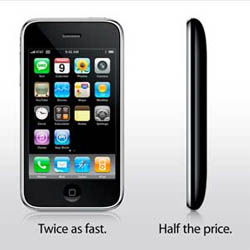Truth in Advertising: Apple Sued Over iPhone Claims
William Gillis, a 70-year-old San Diego resident, has filed suit against Apple for false advertisement of the iPhone 3G. He specifically cites the "twice as fast for half the price" ad as a huge lie, because the network speeds are "grindingly slow". Apple, of course, is fighting back.
Several blogs have pointed out a paragraph in Apple's defense papers regarding their misleading iPhone 3G ad that basically says, "No reasonable consumer would think that we meant what we said!" Common sense says that this should not work as a defense, but stupider things have happened in court. It looks like Apple is trying to convince a judge that consumers are so jaded and cynical these days that the majority of them don't believe any advertising claims and just buy things that they think are shiny.
Truth in advertising is a law, and on the face of it Apple has broken that law. They made a statement, "twice as fast," that was misleading or untrue. But in order to determine if an ad is deceptive, the Federal Trade Commission "looks at the ad from the point of view of the "reasonable consumer" -- the typical person looking at the ad. Rather than focusing on certain words, the FTC looks at the ad in context -- words, phrases, and pictures -- to determine what it conveys to consumers."
If Apple could convince the FTC that reasonable consumers are jaded and don't really believe printed claims, they would be free and clear.
However, this case is civil, not a criminal one, so these same rules may not apply.
Still, if there are any angry 3G customers out there whose cases were dismissed, you might consider complaining to the FTC.
Sign up to receive The Snapshot, a free special dispatch from Laptop Mag, in your inbox.
K. T. Bradford writes about laptops, apps, and ebook readers for Laptop Mag. She has written reviews of some of the most iconic laptops from the last decade and more, covering models such as the Acer Aspire One, the Samsung R580, and the Lenovo IdeaPad S205. Some of her other reviews include MSI, HP, Dell, and Asus notebooks.

